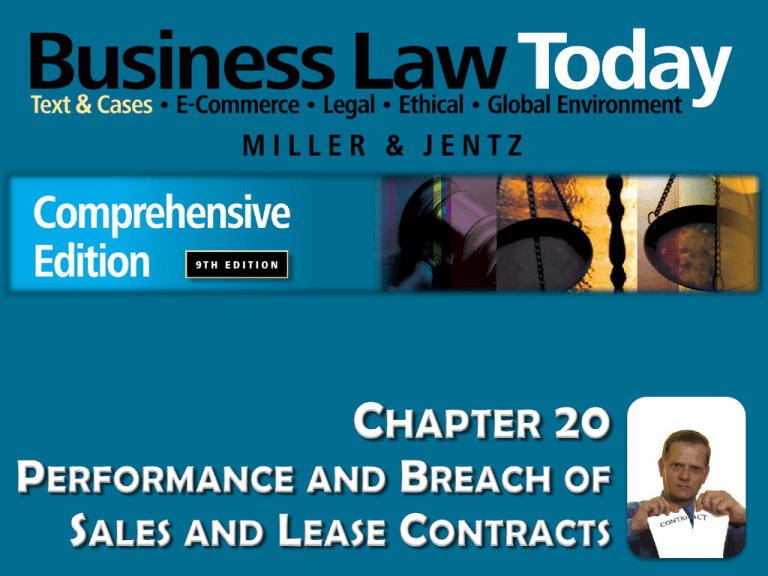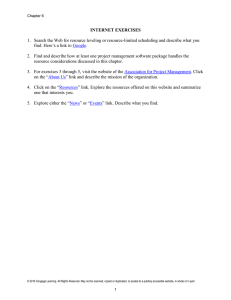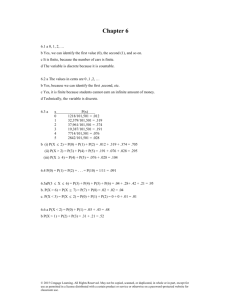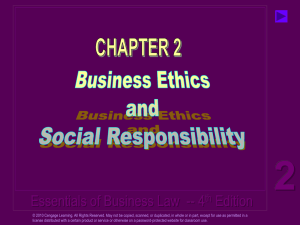
• What are the respective obligations of
the parties under a contract for the
sale or lease of goods?
• What is the perfect tender rule? What
are some important exceptions to this
rule that apply to sales and lease
contracts?
© 2012 Cengage Learning. All Rights Reserved. May not be copied, scanned, or duplicated, in whole or in part, except for use as
permitted in a license distributed with a certain product or service or otherwise on a password-protected website for classroom use.
2
• What options are available to the
nonbreaching party when the other
party to a sales or lease contract
repudiates the contract prior to the
time for performance?
• What remedies are available to a seller
or lessor when the buyer or lessee
breaches the contract?
© 2012 Cengage Learning. All Rights Reserved. May not be copied, scanned, or duplicated, in whole or in part, except for use as
permitted in a license distributed with a certain product or service or otherwise on a password-protected website for classroom use.
3
• What remedies are available to a buyer
or lessee if the seller or lessor breaches
the contract?
• In contracts subject to the UCC, are
parties free to limit the remedies
available to the nonbreaching party on
a breach of contract? If so, in what
ways?
© 2012 Cengage Learning. All Rights Reserved. May not be copied, scanned, or duplicated, in whole or in part, except for use as
permitted in a license distributed with a certain product or service or otherwise on a password-protected website for classroom use.
4
• Seller must transfer and deliver
conforming goods.
• Buyer must accept and pay for
conforming goods.
• In the absence of an agreement
between Seller and Buyer, UCC
Article 2 controls as set out below.
© 2012 Cengage Learning. All Rights Reserved. May not be copied, scanned, or duplicated, in whole or in part, except for use as
permitted in a license distributed with a certain product or service or otherwise on a password-protected website for classroom use.
5
• The UCC’s Good Faith Provision.
– Good faith means honesty in fact.
– Contract Performance: For a merchant, it
means honesty in fact and observance of
reasonable commercial standards of fair
dealing in the trade. Merchants are held
to a higher standard of care than nonmerchants.
© 2012 Cengage Learning. All Rights Reserved. May not be copied, scanned, or duplicated, in whole or in part, except for use as
permitted in a license distributed with a certain product or service or otherwise on a password-protected website for classroom use.
6
• Good Faith and Contract
Performance.
–Seller’s obligation is to transfer and
deliver conforming goods.
–Buyer’s obligation is to accept and pay
for conforming goods.
–Court imposes good faith standards
when contract is unclear.
© 2012 Cengage Learning. All Rights Reserved. May not be copied, scanned, or duplicated, in whole or in part, except for use as
permitted in a license distributed with a certain product or service or otherwise on a password-protected website for classroom use.
7
• Tender of Delivery: occurs when
seller makes conforming goods
available to buyer.
–Requires reasonable notice.
–Tender at a reasonable hour and
manner.
–Generally, all goods in one installment
(unless agreed upon by parties).
© 2012 Cengage Learning. All Rights Reserved. May not be copied, scanned, or duplicated, in whole or in part, except for use as
permitted in a license distributed with a certain product or service or otherwise on a password-protected website for classroom use.
8
• Place of Delivery: parties can agree
goods tendered at a particular
destination for buyer to take
possession.
–If the contract does not specify, then it
is the seller’s place of business (or the
location of the goods.)
© 2012 Cengage Learning. All Rights Reserved. May not be copied, scanned, or duplicated, in whole or in part, except for use as
permitted in a license distributed with a certain product or service or otherwise on a password-protected website for classroom use.
9
• Place of Delivery (cont’d).
–Buyer picks up at Seller’s place of
business or, if Buyer has no place of
business, then Buyer’s residence.
–If both parties know the goods are
elsewhere (at a warehouse), then
place of delivery is where the goods
are.
© 2012 Cengage Learning. All Rights Reserved. May not be copied, scanned, or duplicated, in whole or in part, except for use as
permitted in a license distributed with a certain product or service or otherwise on a password-protected website for classroom use.
10
• Delivery via Carrier.
–Shipment Contracts. Seller has a duty to:
• Put goods into hands of independent
carrier.
• Make contract for transportation.
• Obtain and promptly deliver or tender to
the Buyer any documents necessary.
• Promptly notify Buyer that shipment has
been made.
© 2012 Cengage Learning. All Rights Reserved. May not be copied, scanned, or duplicated, in whole or in part, except for use as
permitted in a license distributed with a certain product or service or otherwise on a password-protected website for classroom use.
11
• Delivery via Carrier (cont’d).
–Destination contracts. Seller has duty to:
• Tender the goods at a reasonable hour and
hold conforming goods at the Buyer’s
disposal for a reasonable period of time.
© 2012 Cengage Learning. All Rights Reserved. May not be copied, scanned, or duplicated, in whole or in part, except for use as
permitted in a license distributed with a certain product or service or otherwise on a password-protected website for classroom use.
12
• The Perfect Tender Rule.
–If goods, or tender of delivery, fail in
any respect to conform to the contract,
the Buyer has the right to:
• Accept the goods;
• Reject the entire shipment; or
• Accept part and reject part.
© 2012 Cengage Learning. All Rights Reserved. May not be copied, scanned, or duplicated, in whole or in part, except for use as
permitted in a license distributed with a certain product or service or otherwise on a password-protected website for classroom use.
13
• The Perfect Tender Rule (cont’d).
–Exceptions:
• Agreement of the Parties: agree that
some defective goods will be acceptable.
• Cure. Seller has right to repair or replace
defective goods within the time of
contract performance. Seller must have
reasonably expected buyer would accept
non-conforming goods.
© 2012 Cengage Learning. All Rights Reserved. May not be copied, scanned, or duplicated, in whole or in part, except for use as
permitted in a license distributed with a certain product or service or otherwise on a password-protected website for classroom use.
14
• The Perfect Tender Rule (cont’d).
–Exceptions (cont’d).
• Cure. Restriction on the Buyer’s or
Lessee’s Right of Rejection. Substantially
restricts right of rejection; buyers must
act in good faith and give specific reasons
for refusing acceptance.
© 2012 Cengage Learning. All Rights Reserved. May not be copied, scanned, or duplicated, in whole or in part, except for use as
permitted in a license distributed with a certain product or service or otherwise on a password-protected website for classroom use.
15
• The Perfect Tender Rule (cont’d).
–Exceptions (cont’d).
• Substitution of Carriers. If a carrier
becomes impracticable or unavailable
through no fault of either party, a
commercially reasonable substitute is
acceptable.
© 2012 Cengage Learning. All Rights Reserved. May not be copied, scanned, or duplicated, in whole or in part, except for use as
permitted in a license distributed with a certain product or service or otherwise on a password-protected website for classroom use.
16
• The Perfect Tender Rule (cont’d).
–Exceptions (cont’d).
• Installment Contracts can be rejected if:
–installment is substantially nonconforming and can’t be cured.
–non-conforming installment
substantially impairs the entire
contract.
© 2012 Cengage Learning. All Rights Reserved. May not be copied, scanned, or duplicated, in whole or in part, except for use as
permitted in a license distributed with a certain product or service or otherwise on a password-protected website for classroom use.
17
• The Perfect Tender Rule (cont’d).
–Exceptions (cont’d).
• Commercial Impracticability. Perfect
tender rule no longer applies. Seller must
notify the buyer as soon as practicable
the shipment is delayed or undeliverable.
© 2012 Cengage Learning. All Rights Reserved. May not be copied, scanned, or duplicated, in whole or in part, except for use as
permitted in a license distributed with a certain product or service or otherwise on a password-protected website for classroom use.
18
• The Perfect Tender Rule (cont’d).
–Exceptions (cont’d).
• Commercial Impracticability.
–Foreseeable versus Unforeseeable
Contingencies: only unforeseeable events
provide a defense. CASE 20.1 Maple Farms
v. City School District of Elmira (1974). Can
unanticipated increases in a seller’s costs
make performance impracticable?
© 2012 Cengage Learning. All Rights Reserved. May not be copied, scanned, or duplicated, in whole or in part, except for use as
permitted in a license distributed with a certain product or service or otherwise on a password-protected website for classroom use.
19
• The Perfect Tender Rule (cont’d).
–Exceptions (cont’d).
• Commercial Impracticability.
–Partial Performance. What happens if the
unforeseeable event only partially affects the
seller’s ability to perform? Seller can reallocate goods with timely notice to buyer.
© 2012 Cengage Learning. All Rights Reserved. May not be copied, scanned, or duplicated, in whole or in part, except for use as
permitted in a license distributed with a certain product or service or otherwise on a password-protected website for classroom use.
20
• The Perfect Tender Rule (cont’d).
–Exceptions (cont’d).
• Destruction of Identified Goods. Bothe
seller and buyer are excused from
performance if destruction is not the fault
of either party, and the destruction occurs
before risk passes to buyer.
© 2012 Cengage Learning. All Rights Reserved. May not be copied, scanned, or duplicated, in whole or in part, except for use as
permitted in a license distributed with a certain product or service or otherwise on a password-protected website for classroom use.
21
• The Perfect Tender Rule (cont’d).
–Exceptions (cont’d).
• Assurance and Cooperation.
–Right of Assurance (in writing). Until
received the other party has the right to
‘suspend’ performance or delivery.
–Duty of Cooperation. If a party is not
cooperating, the other party has the right to
suspend performance.
© 2012 Cengage Learning. All Rights Reserved. May not be copied, scanned, or duplicated, in whole or in part, except for use as
permitted in a license distributed with a certain product or service or otherwise on a password-protected website for classroom use.
22
• Payment.
–Payment made at the time and place
the buyer receives the goods.
–Credit has to be prearranged.
–Pay with cash, credit card, check.
© 2012 Cengage Learning. All Rights Reserved. May not be copied, scanned, or duplicated, in whole or in part, except for use as
permitted in a license distributed with a certain product or service or otherwise on a password-protected website for classroom use.
23
• Right of Inspection.
– Buyer has absolute right to inspection
before payment, unless C.O.D. Goods
must be conforming before payment.
– CASE 20.2 Romero v. Scoggins-Dickey
Chevrolet-Buick, Inc. (2010). Why wasn’t
the ‘contract order’ a binding contract for
sale of goods?
© 2012 Cengage Learning. All Rights Reserved. May not be copied, scanned, or duplicated, in whole or in part, except for use as
permitted in a license distributed with a certain product or service or otherwise on a password-protected website for classroom use.
24
• Acceptance. Buyer can accept
goods:
–By words or conduct.
–If Buyer had reasonable amount of
time and failed to reject.
–Buyer performs an act which indicates
he thinks he is the owner.
© 2012 Cengage Learning. All Rights Reserved. May not be copied, scanned, or duplicated, in whole or in part, except for use as
permitted in a license distributed with a certain product or service or otherwise on a password-protected website for classroom use.
25
• Acceptance (cont’d).
– Partial Acceptance.
• If some of the goods do not conform to
the contract, and seller has failed to cure,
buyer can make a partial acceptance.
• But buyer cannot accept less a single
commercial unit.
© 2012 Cengage Learning. All Rights Reserved. May not be copied, scanned, or duplicated, in whole or in part, except for use as
permitted in a license distributed with a certain product or service or otherwise on a password-protected website for classroom use.
26
• Party communicates he will not
perform when performance due.
• Suspension of Performance
Obligations. Nonbreaching party may
suspend performance and treat the AR as
material breach and pursue a remedy; or
wait a reasonable time.
© 2012 Cengage Learning. All Rights Reserved. May not be copied, scanned, or duplicated, in whole or in part, except for use as
permitted in a license distributed with a certain product or service or otherwise on a password-protected website for classroom use.
27
• A Repudiation May Be Retracted.
–UCC permits breaching party to
‘retract’ repudiation by any method
that clearly indicates their intent.
–However, no retraction if the
nonbreaching party has materially
changed their position.
© 2012 Cengage Learning. All Rights Reserved. May not be copied, scanned, or duplicated, in whole or in part, except for use as
permitted in a license distributed with a certain product or service or otherwise on a password-protected website for classroom use.
28
• When buyer or lessee is in breach,
seller has various remedies under
UCC, depending on circumstances.
–Important considerations: which party
has possession of the goods, whether
goods are in transit, and whether the
buyer has rejected or accepted the
goods.
© 2012 Cengage Learning. All Rights Reserved. May not be copied, scanned, or duplicated, in whole or in part, except for use as
permitted in a license distributed with a certain product or service or otherwise on a password-protected website for classroom use.
29
• When the Goods are in the
Possession of Seller or Lessor.
–Right to Cancel (Rescind) the Contract.
• Seller must notify buyer.
• Buyer is not discharged from remaining
obligations.
© 2012 Cengage Learning. All Rights Reserved. May not be copied, scanned, or duplicated, in whole or in part, except for use as
permitted in a license distributed with a certain product or service or otherwise on a password-protected website for classroom use.
30
• When the Goods are in the
Possession of Seller or Lessor (cont’d).
–Right to Withhold Delivery.
• If material breach by buyer, seller can
withhold delivery of all goods.
• If non-material breach, seller can withhold
delivery of this installment.
• Seller can withhold delivery of all goods if
buyer is insolvent.
© 2012 Cengage Learning. All Rights Reserved. May not be copied, scanned, or duplicated, in whole or in part, except for use as
permitted in a license distributed with a certain product or service or otherwise on a password-protected website for classroom use.
31
• When the Goods are in the
Possession of Seller or Lessor (cont’d).
–Right to Resell or Dispose of Goods:
Seller can resell and keep profits from sale
and hold buyer liable for difference.
• Unfinished Goods: seller can (1) cease
manufacturing, (2) complete manufacture.
Seller can sell and hold buyer responsible
for deficiency.
© 2012 Cengage Learning. All Rights Reserved. May not be copied, scanned, or duplicated, in whole or in part, except for use as
permitted in a license distributed with a certain product or service or otherwise on a password-protected website for classroom use.
32
• When the Goods are in the Possession
of Seller or Lessor (cont’d).
–Right to Recover the Purchase Price or
Lease Payments Due.
• Seller can bring action to recover purchase
price plus incidentals. If unable to resell,
seller must hold goods for buyer.
• Seller can sell goods any time prior to
collecting judgment.
© 2012 Cengage Learning. All Rights Reserved. May not be copied, scanned, or duplicated, in whole or in part, except for use as
permitted in a license distributed with a certain product or service or otherwise on a password-protected website for classroom use.
33
• When the Goods are in the Possession
of Seller or Lessor (cont’d).
–Right to Recover Damages for Buyer’s
Nonacceptance.
• If buyer repudiates goods, seller can bring
action to recover damages.
• Measure of damages: market price at the
time & place of tender + incidental
damages.
© 2012 Cengage Learning. All Rights Reserved. May not be copied, scanned, or duplicated, in whole or in part, except for use as
permitted in a license distributed with a certain product or service or otherwise on a password-protected website for classroom use.
34
• When Goods are in Transit.
–Goods are “in transit” when Seller has
tendered goods to Carrier.
–Seller can stop goods in transit if:
• Buyer is insolvent - Seller can stop entire
shipment of goods.
• Buyer is in breach - Seller may stop a whole
truckload or whole container.
© 2012 Cengage Learning. All Rights Reserved. May not be copied, scanned, or duplicated, in whole or in part, except for use as
permitted in a license distributed with a certain product or service or otherwise on a password-protected website for classroom use.
35
• When Goods are in Transit (cont’d).
–Seller has the right to stop delivery of
the goods until:
• Buyer receives the goods.
• Carrier or bailee acknowledges rights of
buyer in the goods (reshipment or holding
goods for buyer).
• Negotiable document of title has been
transferred to buyer’s possession.
© 2012 Cengage Learning. All Rights Reserved. May not be copied, scanned, or duplicated, in whole or in part, except for use as
permitted in a license distributed with a certain product or service or otherwise on a password-protected website for classroom use.
36
• When Goods are in Possession of the
Buyer or Lessor.
–Seller may sue for the purchase price.
• Seller may also sue Buyer if goods were
“specially-made” which Seller cannot
resell.
• Seller may also sue for the purchase price
if the goods were destroyed and the risk
had already passed to the Buyer.
© 2012 Cengage Learning. All Rights Reserved. May not be copied, scanned, or duplicated, in whole or in part, except for use as
permitted in a license distributed with a certain product or service or otherwise on a password-protected website for classroom use.
37
• When Goods are in Possession of the
Buyer or Lessor (cont’d).
–In some situations, seller can reclaim
goods received by an insolvent buyer if
demand made within 10 days of
receipt.
–Seller’s right to reclaim goods is subject
to rights of a good faith purchaser.
© 2012 Cengage Learning. All Rights Reserved. May not be copied, scanned, or duplicated, in whole or in part, except for use as
permitted in a license distributed with a certain product or service or otherwise on a password-protected website for classroom use.
38
• When Seller or Lessor Refuses to
Deliver the Goods. Buyer has the
right to:
–Cancel (rescind) the contract.
–Recover Goods paid for if seller
insolvent: whether partial or full
payment.
© 2012 Cengage Learning. All Rights Reserved. May not be copied, scanned, or duplicated, in whole or in part, except for use as
permitted in a license distributed with a certain product or service or otherwise on a password-protected website for classroom use.
39
• When Seller or Lessor Refuses to
Deliver the Goods (cont’d).
–Buyer has the right to:
• Sue to obtain specific performance and
recover damages.
–CASE 20.3 Houseman v. Dare (2009).
Does return of a pet require specific
performance?
© 2012 Cengage Learning. All Rights Reserved. May not be copied, scanned, or duplicated, in whole or in part, except for use as
permitted in a license distributed with a certain product or service or otherwise on a password-protected website for classroom use.
40
• When Seller or Lessor Refuses to
Deliver the Goods (cont’d).
–Buyer has the right to:
• Cover: in some situations.
• Replevy goods if held by third person.
• Recover Damages.
© 2012 Cengage Learning. All Rights Reserved. May not be copied, scanned, or duplicated, in whole or in part, except for use as
permitted in a license distributed with a certain product or service or otherwise on a password-protected website for classroom use.
41
• When Seller or Lessor Delivers
Nonconforming Goods.
–Right to Reject Goods.
• Timeliness and Reason for Rejection. Buyer
must timely notify Seller of rejection and
reasons and follow Seller’s directions.
• Duties of Merchants When Goods
Rejected: Good faith obligation to follow
instructions.
© 2012 Cengage Learning. All Rights Reserved. May not be copied, scanned, or duplicated, in whole or in part, except for use as
permitted in a license distributed with a certain product or service or otherwise on a password-protected website for classroom use.
42
• When Seller or Lessor Delivers
Nonconforming Goods (cont’d).
–Revocation of Acceptance for
substantial nonconformity, and:
• Acceptance assumed defect would be
cured, or
• Nonconformity was discovered after
acceptance.
• Notice must be given to seller.
© 2012 Cengage Learning. All Rights Reserved. May not be copied, scanned, or duplicated, in whole or in part, except for use as
permitted in a license distributed with a certain product or service or otherwise on a password-protected website for classroom use.
43
• When Seller or Lessor Delivers
Nonconforming Goods (cont’d).
–Right to Recover Damages for Accepted
Goods. Buyer may keep the goods and:
• Recover any loss in ordinary course of
events. With notification to seller.
• Measure of damages: difference between
value of accepted goods and goods as
warranted.
© 2012 Cengage Learning. All Rights Reserved. May not be copied, scanned, or duplicated, in whole or in part, except for use as
permitted in a license distributed with a certain product or service or otherwise on a password-protected website for classroom use.
44
• Exclusive Remedies.
• Consequential Damages.
• Lemon Laws.
© 2012 Cengage Learning. All Rights Reserved. May not be copied, scanned, or duplicated, in whole or in part, except for use as
permitted in a license distributed with a certain product or service or otherwise on a password-protected website for classroom use.
45








